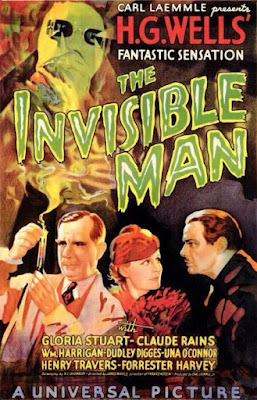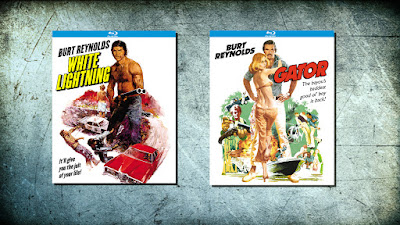The Invisible Man (1933)
I recently had the great pleasure of picking up Universal's newly-released The Invisible Man Legacy Collection, which contains all six films from the classic horror series. As I've been making my way through the set, it occurs to me that I've been unfair to this particular franchise; I have relegated the character of The Invisible Man to second-string status, not of the same pedigree as the titans of horror, particularly Bela Lugosi's Dracula, Boris Karloff's Frankenstein, and Lon Chaney Jr.'s Wolf Man. In all honesty, I'm still struggling with whether or not The Invisible Man, The Creature From The Black Lagoon, and The Mummy exist on a lower level than their iconic brethren, but I will also admit that I think I've misjudged The Invisible Man, particularly the first film in the series from 1933. It's time for a Cereal At Midnight review!
I've seen James Whale's The Invisible Man before, of course, but it's been years since I last viewed the film. Revisiting it again on Blu-ray in the last few days, I've discovered a movie that speaks to me possibly more than any of the other Universal Monster films. See, my go-to answer when someone asks me what my favorite Universal Monster movie is has always been James Whale's The Bride of Frankenstein because it's so delightfully subversive and goes against all expectations. There's also a darkness in that movie that doesn't go too far, but still feels dangerous. Well, now I've revisited The Invisible Man and I'm convinced that this might be James Whale's most subversive monster movie. Of course, I also have to tip my hat to the masterpiece (yes, masterpiece) that is James Whale's slightly less-recognized horror film, The Old Dark House. But for my cereal money, The Invisible Man has just shot to the top of my list.
There is so much to enjoy and so much to analyze. Where to begin? This movie, like so many of the Universal horrors, exists in a weird, nonexistent landscape that is completely unique to Universal films from the era. Our story begins in a quaint European village circa the 19th century, where its citizens ride horse-drawn carriages and descend upon the town square for a drink in the tavern. Yet, outside that quaint village lies a land of shadows, sharp and angular, a nightmare dreamscape hailing directly from German Expressionism. And even further outside of that, there is the world we know...or at least the world that society in the 1930s would have recognized. Modern characters dress in double-breasted suits, scientists have all the latest equipment, like electricity, automobiles, and I even spotted a hot water heater in one scene. There seem to be three distinct dimensions that comprise the world of Universal Horror, and they're all on full display in The Invisible Man.
The plot of The Invisible Man hews closely to the original story by author H.G. Wells, who had been burned in the past by liberal adaptations and demanded that this movie didn't deviate too far from the foundation of his source material. The incomparable Claude Rains (Casablanca) stars as Dr. Jack Griffin, a scientist who has flown too close to the sun on wings of wax. Cue the Mr. Mister song "Broken Wings." Dr. Griffin has experimented with a formula that has rendered him invisible, but also driven him quite mad. Claude Rains is fantastic in the role, especially given that he spends nearly the entire movie either not visible or wrapped in layers of gauze. The entirety of his performance comes from his body language and his voice.
There's a mystery at hand that must be solved as the supporting cast discovers the answers to their questions along with the audience themselves. Gloria Stuart, perhaps most widely known as the elderly Rose in James Cameron's Titanic, is wonderful as the female lead, and she's not entirely relegated to wringing her hands at the window as she waits for word of our scientist. There's a blink-and-you'll-miss-it appearance by Dwight Frye (Renfield in Dracula and Karl in Bride of Frankenstein) as well as a short appearance by film legend John Carradine, who would eventually go on to star as Dracula himself. Una O'Connor, a James Whale staple, appears in the same capacity here that she does in The Bride of Frankenstein, shrieking and acting very put out. It's no secret that James Whale thought Una O'Connor was hilarious, but I always struggle to warm up to her unique brand of humor. Frankly, as an introvert, it's just way too much for me. Every time I watch these movies, I wonder if this will be the time she doesn't get on my nerves anymore. It never is.
At the end of the day, the biggest draw of the Universal Monster films for me is the world that they allow us to visit and the dark delight that they seem to take in being there. I mentioned earlier that I now view The Invisible Man as the most subversive of all of these movies, but here's why: Whale seems to take great pleasure in the premise of his story. He wallows in it. While The Invisible Man is indeed a tragedy, there's so much dark humor in the film that I can't overlook how much fun everyone seems to be having. First and most obvious is the fact that The Invisible Man himself has to get completely naked to be invisible. This is no doubt a holdover from the H.G. Wells novel (full disclosure: I've never read the book), but seems to be played here for maximum ribaldry, especially in the mischievous hands of James Whale. Consider a scene where our afflicted scientist struggles to escape a mob that has formed against him. As he's removing his clothes to become completely invisible, he says "This will give them a shock" at the exact moment that he drops his pants. Accident? I don't think so.
The movie seems to take every opportunity to revel in Dr. Griffin's bad behavior. While making a getaway, The Invisible Man overturns a baby carriage with a baby still in it. he pushes people over the side of a cliff in a moment that is both shocking and darkly comic at the same time. There's a train derailment scene, and another scene in which a car goes off the road and plummets hundreds of feet, exploding in mid-air before it crashes onto the rocks below. Though horror movies of the early 1930s were allowed to exploit bad behavior (see all the Warner Brothers gangster films for more examples), they always had to have a moral ending in which the person behind the horrible behavior was punished. So we have a 71 minute movie in which about 65 of those minutes are spent with a guy being an absolute jerk. You can tell Whale is having a blast, and it's hard not to have a blast watching it. Though the moral comes, you get the impression no one is sorry and any apology for previous mischief seems hollow, at best. Hey, we're all just having fun.
So I raise my glass to The Invisible Man, a movie I'm certainly familiar with, but one that hadn't really clicked for me until just a few days ago. Maybe it does exist on a second tier, but there's so much delightful mischief contained in 71 minutes that it has become a strong contender for my favorite Universal monster movie. I'm so invigorated by my screening of the movie that I'm going to be writing short reviews for all six of the movies, just like I did with The Mummy franchise last year. Hey, what's the worst that could happen? Why, only total franchise burnout! So I'll see you back here soon to discuss the 1940 sequel, which stars a young Vincent Price as the title character. In the meantime, stay alert: you never know who might be standing next to you, secretly watching.








Comments
Post a Comment